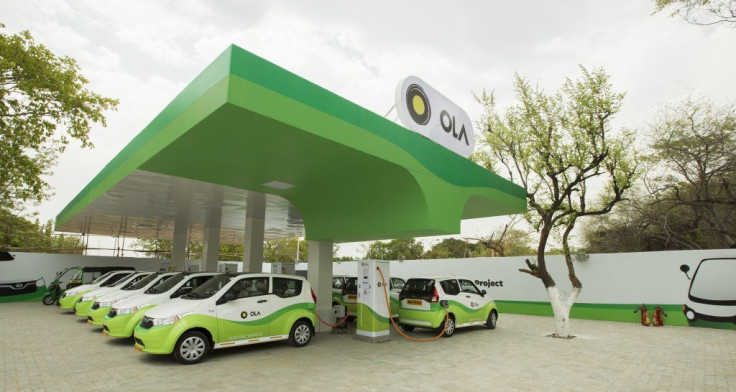Indian Ride Hailing Firm Ola Slashes 1,400 Jobs As Pandemic Decimates Demand, Postponed Plans To Expand To London

KEY POINTS
- The layoffs amount to 35% of the company’s Indian workforce
- Ola's revenues plummeted by 95% over the past two months
- SoftBank as an investor in Ola
Indian ridesharing firm Ola will cut 1,400 jobs in India as the coronavirus pandemic and related lockdown has damaged its business.
The layoffs amount to 35% of the company’s Indian workforce.
Ola, which includes Japanese conglomerate SoftBank as an investor, said its revenues plummeted by 95% over the past two months as stay-at-home orders in India decimated demand for its taxi app.
The job cuts will largely hit Ola’s mobility and food delivery units. Ola Electric, a separate entity of the ride-hailing firm, was not affected by layoffs.
“I have personally spent significant time, reviewing and revisiting every single aspect of this exercise as each one of the impacted individuals has played an important role in building Ola and are the most talented and passionate people I have come across,” said co-founder and CEO Bhavish Aggarwal in an email to staff on Wednesday. “These decisions are not reflective of anyone’s performance and are purely a function of the uncontrollable circumstances that we have been faced with.”
Aggarwal added the layoffs were “the toughest decision I have ever taken.”
Aggarwal also said there would be no additional layoffs and that the company will offer various benefits to fired workers, including three months’ pay, stock options and insurance coverage.
"All affected employees will be able to continue using their medical, life and accident insurance cover for themselves and their families up to Dec. 31, 2020 or the start of their next job whichever is earlier, to help minimize the financial burden of health and other risks in a time like this," Aggarwal said.
In the past Ola had sought to become profitable and go public in a few years. Now those targets have likely been postponed.
“This crisis necessitates the need to conserve cash aggressively so that we are able to invest in opportunities in the future,” Aggarwal said.
Prior to the pandemic, Ola was expanding aggressively overseas, including a foray into London in February, where it sought to challenge Uber (UBER). Uber and Lyft (LYFT) have also enacted job cuts due to the global pandemic.
“We had all hoped in the beginning that this would be a short-lived crisis and that its impact would be temporary,” Aggarwal said. “Over the past couple of months, all members of our extended leadership team have taken significant salary cuts to be able to help the organization delay tougher people decisions as we waited for the situation to evolve. But unfortunately, it’s not been a short crisis.”
Looking ahead, the Ola chief warned: “And the prognosis ahead for our business is very unclear and uncertain. It is going to take a long time for people to go out and about like before. With more companies preferring to have a large number of employees work from home, air travel limited to essential trips and vacations being put off for better times, the impact of this crisis is definitely going to be long-drawn for us. The world is not going to revert to the pre-COVID era anytime soon.”
In some parts of India, Ola and Uber have resumed services as the nationwide lockdown has partly eased.
Aggarwal nonetheless evinced some hope for the company’s near future.
“While we restructure our organization to the new realities of our business, we are also going to recommit ourselves to strengthening our operational excellence,” he said. "We are increasing our investments and adding people capabilities in R&D as a group, through this crisis to double down on innovation and engineering...This crisis is accelerating macro trends of digital commerce and clean mobility, and our businesses are well-positioned to leverage these macro trends well.”
Yugal Joshi, Vice President at Dallas,Texas-based consultancy Everest Group, commented: “Shared mobility services like cabs may get pushed out for six-nine months post-Covid as consumers will be hesitant to book rides. The number of trips may get curtailed. So there will be a challenge for these firms. However, the value proposition of shared mobility is very strong and it will continue as a seminal trend.”
Ola has thus far raised $3.8 billion from investors including SoftBank, China’s Tencent and South Korean automakers Hyundai and Kia.
SoftBank recently recorded a huge $17.7 billion loss for its first Vision Fund.
© Copyright IBTimes 2025. All rights reserved.





















